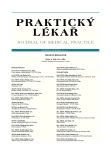-
Medical journals
- Career
Psychoactive substances abuse and diabetes mellitus
Authors: K. Nešpor 1; L. Vincent 2
Authors‘ workplace: Odděleni léčby závislostí – muži, Primář: MUDr. Karel Nešpor, Csc., Psychiatrická léčebna Bohnice, Praha, Ředitel: MUDr. Martin Hollý 1; Praktický lékař pro děti a dorost, Mlýnská 367, 683 23 Ivanovice na Hané 2
Published in: Prakt. Lék. 2012; 92(1): 50-52
Category: Of different specialties
Overview
Abuse of psychoactive substances, particularly in diabetic patients means risk from biological and psychosocial reasons. Number of diabetics in the Czech Republic in 2010 was around 800 000 people. In addition, Czech belongs to the countries with the highest alcohol consumption in the world and there is a high-above-average consumption of non-alcohol drugs. Frequent is also the abuse of tobacco. It is obvious that the sets of people with diabetes and those who abuse psychoactive substances, are overlap. Doctors of all clinical disciplines should give this issue proper attention. Short intervention and treatment for problems caused by psychoactive substances can prevent complications and greatly facilitate the treatment of diabetes.
Key words:
psychoactive substances, risk, diabetes mellitus, short intervention.
Sources
1. Alexandre, M., Pandol, S.J., Gorelick, F.S., Thrower, E.C. The Emerging Role of Smoking in the Development of Pancreatitis. Pancreatology. 2011 5; 11(5): 469-474.
2. Česká diabetologická společnost: Národní diabetologický program 2000. www.diab.cz/narodni-diabetologicky-program. Accessed, 3. 11. 2011
3. Hätönen, K.A., Virtamo, J., Eriksson, J.G. et al. Coffee does not modify postprandial glycaemic and insulinaemic responses induced by carbohydrates. Eur. J. Nutr. 2011 Oct. 25. [Epub ahead of print]
4. Hézode, C., Zafrani, E.S., Roudot-Thoraval, F. et al. Daily cannabis use: a novel risk factor of steatosis severity in patients with chronic hepatitis C. Gastroenterology. 2008,134(2), p. 432-439.
5. Johnson, K.H., Bazargan, M., Cherpitel, C.J. Alcohol, tobacco, and drug use and the onset of type 2 diabetes among inner-city minority patients. J. Am. Board Fam. Pract. 2001,14(6), p. 430-436.
6. Mohs, M.E., Watson, R.R., Leonard-Green, T. Nutritional effects of marijuana, heroin, cocaine, and nicotine. J. Am. Diet. Assoc. 1990, 90(9), p. 1261-1267.
7. Nešpor, K. Krátká intervence a první pomoc pro lidi s návykovými nemocemi Prakt. Lék. 2011, 91(8), s. 483–486.
8. Nešpor, K. Návykové chování a závislost, 4. aktualizované vydání. Praha: Portál 2011, p. 176.
9. Nešpor, K, Matanelli, O. Interakce alkoholu a jiných látek: komplikovaný problém. Prakt. Lék. 2011, 91(11), s. 532-533.
10. Nešpor, K. Alkohol a diabetes – co mohou udělat sestry. Sestra 2008, 18(6), s. 53.
11. Ng, R.S., Darko, D.A., Hillson, R.M. Street drug use among young patients with Type 1 diabetes in the UK. Diabet. Med. 2004, 21(3) p. 295-296.
12. Nicolucci, A. Epidemiological aspects of neoplasms in diabetes. Acta. Diabetol. 2010,47(2), p. 87-95.
13. Nyenwe, E.A., Loganathan, R.S., Blum, S. et al. Active use of cocaine: an independent risk factor for recurrent diabetic ketoacidosis in a city hospital. Endocr. Pract. 2007, 13(1) p. 22-29.
14. Panagiotakos, D.B., Lionis, C., Zeimbekis, A. et al. Long-term tea intake is associated with reduced prevalence of (type 2) diabetes mellitus among elderly people from Mediterranean islands: MEDIS epidemiological study. Yonsei. Med. J. 2009, 50(1), p. 31-38.
15. O’Donnell, M.J., Xavier, D., Liu, L. et al. Risk factors for ischaemic and intracerebral haemorrhagic stroke in 22 countries (the INTERSTROKE study): a case-control study. Lancet 2010, 376(9735), p. 112-123.
16. Parry, C.D., Patra, J., Rehm, J. Alcohol consumption and non-communicable diseases: epidemiology and policy implications. Addiction 2011, 106(10), p. 1718-1724.
17. Rebello, S.A., Chen, C.H., Naidoo, N. et al. Coffee and tea consumption in relation to inflammation and basal glucose metabolism in a multi-ethnic Asian population: a cross-sectional study. Nutr. J. 2011,10, p. 61.
18. Selvarajah, D., Gandhi, R., Emery, C.J., Tesfaye, S. Randomized placebo-controlled double-blind clinical trial of cannabis-based medicinal product (Sativex) in painful diabetic neuropathy: depression is a major confounding factor. Diabetes Care 2010, 33(1), p. 128-130.
Labels
General practitioner for children and adolescents General practitioner for adults
Article was published inGeneral Practitioner

2012 Issue 1-
All articles in this issue
- Basics of social cognitive and affective neuroscience; XIII. Creativity
- Strategy of antiaggregation treatment after percutaneous coronary interventions
- Potentially inappropriate (risky) drugs at geriatric patients Expert consensus for the Czech Republic 2012
- Economic burden of alcohol abuse
- Problems of colorectal carcinoma in primary care
- Current role of endoscopic ultrasound investigation in the diagnosis of pancreatic diseases – our experiences
- Risk factors for cardiovascular diseases in regular yoga practitioners in comparison with general population
- A survey of motivational factors in non-medical health professionals
- Psychoactive substances abuse and diabetes mellitus
- General Practitioner
- Journal archive
- Current issue
- Online only
- About the journal
Most read in this issue- Current role of endoscopic ultrasound investigation in the diagnosis of pancreatic diseases – our experiences
- Psychoactive substances abuse and diabetes mellitus
- Potentially inappropriate (risky) drugs at geriatric patients Expert consensus for the Czech Republic 2012
- A survey of motivational factors in non-medical health professionals
Login#ADS_BOTTOM_SCRIPTS#Forgotten passwordEnter the email address that you registered with. We will send you instructions on how to set a new password.
- Career

